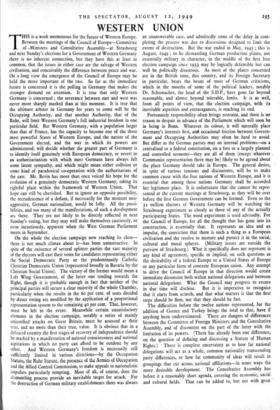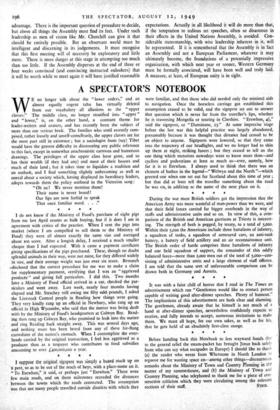WESTERN UNION
THIS is a week momentous for the future of Western Europe. Between the meetings of the Council of Europe—Committee of -Ministers and Consultative Assembly—at Strasbourg and next Sunday's elections for a Government of Western Germany there is no inherent connection, but they have this at least in common, that the issues in either case are the salvage of Western civilisation, and conceivably the difference between peace and war. On a long view the emergence of the Council of Europe may be held the more important of the two. So far as the immediate future is concerned it is the polling in Germany that makes the stronger demand on attention. It is true that only Western Germany is concerned ; the severance between east and west was never more sharply marked than at this moment. It is true that the ultimate arbiter in Germany for years to come will be the Occupying Authority, and that another Authority, that of the Ruhr, will limit Western Germany's full industrial freedom in one particular field. But Western Germany, with a population larger than that of France, has the capacity to become one of the three most powerful States of Western Europe, and the nature of the Government elected, and the way in which its powers are administered, will decide whether the greater part of Germany is to identify itself genuinely with European democracy, or revert to an authoritarianism with .which most Germans have always felt some latent sympathy, and which might mean either collision or some kind of paradoxical co-operation with the authoritarians of the east. Mr. Bevin has more than once voiced his hope for the evolution of a genuinely democratic Western Germany, taking its rightful place within the framework of Western Union. That hope can still be cherished. But to ignore an opposite possibility, the recrudescence of a defiant, if necessarily for the moment non- aggressive, German nationalism, would be folly. All the possi- bilities, and too many of the manifestations, of such a development arc there. They are not likely to be directly reflected in next Sunday's voting, but they may well make themselves cautiously, or even incautiously, apparent when the West German Parliament meets in September.
On the whole the election campaign now reaching its close— there is not much climax about it—has been uninstructive. In spite of the existence of several splinter parties the vast majority of the electors will cast their votes for candidates representing either the Social Democratic Party or the predominantly Catholic Christian Democratic Union (represented broadly in Bavaria by the Christian Social Union). The victory of the former would mean a Left Wing Government, of the latter one tending towards the Right, though it is probable enough in fact that neither of the principal parties will secure a clear majority of the whole Chamber, particularly when the results in the 60 per cent. of seats decided by direct voting arc modified by the application of a proportional representation system to the remaining 40 per cent. That, however, must be left to the event. Meanwhile certain unsatisfactory elements in the election campaign, notably a series of mainly unjustified attacks on Great Britain, must be assessed at their true, and no more than their true, value. It is obvious that in a defeated country the first stages of recovery of independence should be marked by a manifestation of national consciousness and national aspirations in which no party can afford to be outdone by any other. And Western Germany's freedom is necessarily still sufficiently limited in various directions—by the Occupation Statute, thc Ruhr Statute, thc presence of the Armies of Occupation and the Allied Control Commission, to make appeals to nationalistic Impulses particularly tempting. Most of all, of course, does the dismantling process provide an inevitable target for attack. For the destruction of German military establishments there was always an unanswerable case, and admittedly some of the delay in com- pleting the process was due to discussions designed to limit the extent of destruction. But the war ended in May, 1945 ; this is August, 1949; to be dismantling German production plants, not essentially military in character, in the middle of the first free election campaign since 1933 may be logically defensible but can well be politically disastrous. As most of the plants concerned are in the British zone, this country, and its Foreign Secretary in particular, bears the brunt of most of German criticisms, which in the mouths of some of the political leaders, notably Dr. Schumacher, the head of the S.D.?., have gone far beyond reasonable, and almost beyond tolerable, limits. It is as well, from all points of view, that the election campaign, with its inevitable asperities and extravagances, is reaching its end.
Fortunately responsibility often brings restraint, and there is no reason to despair in advance of the Parliament which will soon be in being in Bonn. Whatever its colour, it will naturally place Germany's interests first, and occasional friction between Govern- ment and Occupying Authorities may often be hard to avoid. But differ as the German parties may on internal problems—on a centralised or a federal constitution, on a free or a largely planned and controlled economy—they are all of them (except whatever Communist representation there may be) likely to be agreed about the place Germany should take in Europe. The general desire, in spite of various tensions and discontents, will be to make common cause with the free nations of Western Europe, and it is essential that among those nations Germany shall be accorded her legitimate place. It is unfortunate that she cannot be repre- sented at the current meetings at Strasbourg, as they will be over before the first German Government can be formed. Even so the 32 million electors of Western Germany will be watching the Strasbourg experiment as closely as those of any of the actually participating States. The word experiment is used advisedly. For the Council of Europe, for all the thought that has gone into its construction, is essentially that. It represents an idea and an impulse, the conviction that there is such a thing as a European civilisation and the resolve to nurture and protect it in the social, cultural and moral spheres. (Military issues are outside the purview of Strasbourg.) What it specifically does not represent is any kind of agreement, specific or implied, on such questions as the desirability of a federal Europe or a United States of Europe or any particular form of concrete European union. Any attempt to drive the Council of Europe in that direction would create immediate dissension both within national delegations and between national delegations. What the Council may progress to events in due time will disclose. But it is imperative to recognise that it starts from scratch, and that what matters is that the first steps should be firm, not that they should be fast. The difficulties before the twelve nations represented, for the addition of Greece and Turkey brings the total to that, have if anything been underestimated. There are dangers of differences between the Committee of Foreign Ministers and the Consultative Assembly, and of discontent on the part of the latter with the limitation of its powers. (There has already been one difference, on the question of defining and discussing a Statute of Human Rights.) There is complete uncertainty as to how far national delegations will act as a whole, common nationality transcending party differences, or how far community of ideas will result in groupings that cut across national affiliations—in some ways the more desirable development. The Consultative Assembly has before it a reasonably short agenda, covering the economic, social and cultural fields. That can be added to, but not with great advantage. There is the important question of procedure to decide, but above all things the Assembly must find its feet. Under such leadership as men of vision like Mr. Churchill can give it that should be entirely possible. But an observant world must be intelligent and discerning in its judgements. It must recognise that this first meeting will of necessity be exploratory and little more. There is more danger at this stage in attempting too much than too little. If the Assembly disperses at the end of three or four weeks convinced (and convincing instructed onlookers) that it will be worth while to meet again it will have justified reasonable expectations. Actually in all likelihood it will do more than that, if the temptation to tedious set speeches, often so disastrous in their effects in the United Nations Assembly, is avoided. Con- siderable statesmanship, with wise leadership inherent in it, will be represented. If it is remembered that the Assembly is in fact an Assembly and not a European Parliament, whatever it may ultimately become, the foundations of a potentially impressive organisation, with which next year or sooner, Western Germany must be formally associated, will have been well and truly laid. A measure, at least, of European unity is in sight.































 Previous page
Previous page